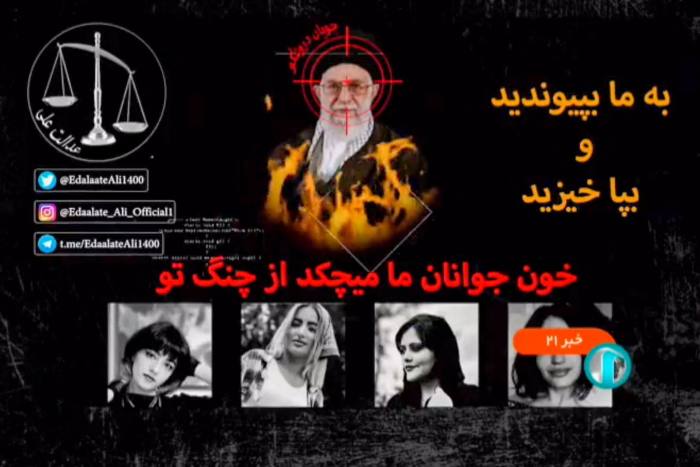When Iranian musician Shervin Hajipour sang about young Iranians’ desire “for a normal life” and “for freedom”, he had little idea his words would become a manifesto for anti-regime demonstrators.
But the 25-year-old musician’s use of social media to highlight Iranian protests over the death of a young woman in the custody of the morality police quickly went viral.
The video on his Instagram page was viewed more than 40mn times in two days and earned him one week’s detention in an Iranian prison before his release on bail. He was widely seen to be articulating the concerns of a younger generation, who want a modern lifestyle and do not identify with the ruling theocracy.
“In the absence of established political parties, this young man announced what young protesters want,” said Hamid-Reza Jalaeipour, a sociologist. For the past three decades, change has been happening in Iranian society, even if slowly, he said, but now there is a “social revolution in the making”.

Protests over the death of Mahsa Amini have widened to include calls for a secular, democratic government. The unrest has been amplified by social media and, in some cases, celebrities with large online followings.
The protests continued over the weekend, with one of the biggest bouts of unrest seen on Saturday, when protesters entered Tehran’s Grand Bazaar for the first time and urged shopkeepers to shut their businesses.
Meanwhile, anti-regime activists hacked into a live broadcast on state television to show an image of supreme leader Ayatollah Ali Khamenei, surrounded by flames and linking him to Amini’s death.
Iranian leaders blame foreign governments for fanning the protests. Celebrities have encouraged street protests, said Iran’s judiciary chief Gholam-Hossein Mohseni-Ejei, saying that “those who have become famous with the support of this system now echo the enemy’s voice”.
With videos of young people engaged in stand-offs with riot police going viral, Iranian leaders have limited access to Instagram and WhatsApp.
Hediyeh Tehrany, a prominent actress, said on her Instagram account that she had received “the warning” from security officials, indicating that she should be careful about what she posts to her 967,000 followers.
People who are fed up do not need her “to call on them [to protest]”, she said, telling security forces that “you are the host of this bloody feast” while “my only way to communicate with people is the streets” where protests happen.
Mehdi Mahdavikia, a former football star who this month resigned as head coach of Iran’s national under-23 football team, has blamed authorities for sending their own children abroad to enjoy “absolute welfare” and expect people to “eat stale bread” while mistreating women such as Amini.
Last week, he criticised security forces for attacking Tehran’s prestigious Sharif University and arresting its students. For decades they have made “the intellectual elite and national human capitals flee the country by suppressing and beating students”, he said. “The important positions are held by illiterate people which is why the country is in such a mess.”
The mysterious disappearance and death in recent weeks of Nika Shakarami, a 17-year-old protester, who authorities say fell from a building, has also stirred anger. Mahtab Keramati, an actress and a Unicef Iran Goodwill Ambassador, shared pictures of nine teenagers killed, injured or arrested during the protests including Shakarami. She removed her post on Friday, fuelling suspicions that she did so under pressure from security forces.
Ali Karimi, a former football star with 13.3mn followers on Instagram who has recently left Iran, is actively encouraging people to demand their rights. “My dear Nika! All Iranians are ashamed of the way you were killed. Rest in Peace my daughter,” said one of his posts on Thursday.
Mehran Modiri, a popular social satirist and talk show host, has stopped broadcasting his Get Together talk shows following Amini’s death.
The celebrities’ actions have been widely criticised in state media and some have been banned from leaving the country. Javan newspaper, affiliated to the Revolutionary Guards, said celebrities from football players to movie stars, are neither ready to “pay the price for their silence” for fear of losing popularity “nor are ready to accompany” protesters for fear of losing their jobs.
The supreme leader said the words of “a few sport and art figures” who sided with the protesters “are not worth” any attention and “are not significant”.
For many, the protests underline the gulf between ordinary Iranians and the regime. Gholam-Ali Haddad Adel, a former hardliner speaker of parliament, warned in a meeting with fellow professors at Tehran University that society was “going speedily toward being polarised” between pro- and anti-regime forces.
Ali Tayebnia, a former minister of economy, said that young people “see no bright future and have nothing to lose”. They want “to drive good cars, dress nicely, have good jobs and have welfare”, Fatemeh Rakei, a reformist politician, told Etemad daily newspaper. She added: “These demands will not materialise with [US] sanctions, mismanagement and fraud.”
What is clear is that young people dominate the protests. Brig Gen Ali Fadavi, deputy commander of the Revolutionary Guards, said this week that the average age of those arrested was 15 years old. He described them as “victims” and “addicts” of social media and hence “delicious bites for the enemy”.
In one video, high school girls without hijabs sing along to Hajipour’s lyrics, written on the white board in front of them. They want freedom, they sing, “For dancing in the alley. For being afraid of kissing one another . . . For changing brains which have got rotten. For being embarrassed. For being moneyless. For yearning for a normal life.”
"celebrities" - Google News
October 10, 2022 at 11:00AM
https://ift.tt/sxpRQ9J
Iranian celebrities fan flames of anti-regime protests - Financial Times
"celebrities" - Google News
https://ift.tt/LeQCqdm
https://ift.tt/1jHCnav
Bagikan Berita Ini















0 Response to "Iranian celebrities fan flames of anti-regime protests - Financial Times"
Post a Comment